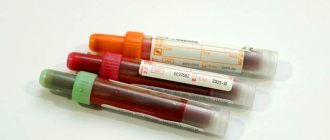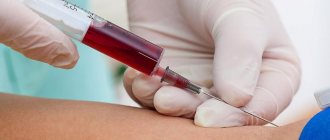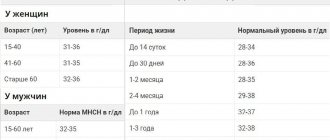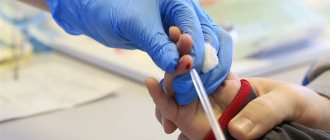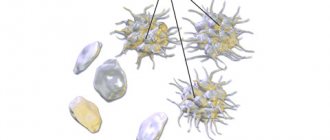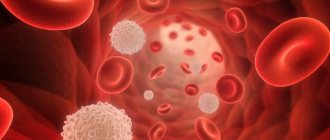Before donating blood for analysis, you need to learn a number of rules, without which an accurate result is impossible.
Alla Nikolaevna Mikhailova, a laboratory diagnostics doctor at the INVITRO Independent Laboratory in Moscow, advises.
— The most accurate research result depends both on the level of the laboratory in which the analysis is carried out, and on the preparedness of the patients themselves. Currently, laboratory doctors have prepared special recommendations, the development of which took into account the requirements of international protocols in the field of laboratory diagnostics and European companies that manufacture automated laboratory equipment.
Before or after food?
Some studies require preliminary preparation, in particular, restrictions on food intake. Do the following on an empty stomach:
- Biochemical studies: glucose, creatinine, bilirubin, triglycerides, lipid profile;
- Blood test for infections: syphilis, hepatitis B antigen
- Hormones: TSH, parathyroid hormone.
Carefully follow your doctor's recommendations: if you need to donate blood on an empty stomach, then at least 8 hours should pass between the last meal and blood collection, and for triglycerides - at least 12 hours. Juice, tea, coffee, especially with sugar, are also food, so you will have to be patient. You can only drink water.
One or two days before the examination, it is advisable to exclude fatty, fried foods and alcohol from the diet. If you had a large feast the day before, reschedule the laboratory test for a day or two, and refrain from smoking an hour before taking blood.
If you have to take a general blood test, the last meal should be no earlier than an hour before the procedure and may consist of unsweetened tea, porridge - without sugar, milk and butter. You can donate blood for antibodies to HIV infection, viral hepatitis, rubella, cytomegalovirus and a number of other infections in the morning, afternoon or evening, and without prior fasting. And one moment.
The content of many blood parameters is subject to daily - so-called circadian - fluctuations. Therefore, blood to determine TSH, parathyroid hormone, and also for iron is donated on an empty stomach, strictly before 10 a.m. In general, it is advisable to always conduct studies of hormone concentrations at the same time - in this case, a comparative analysis of the results obtained will be more correct.
Preparing for a blood test
General rules when preparing for blood tests (clinical, biochemical, enzyme immunoassay blood tests)
The study is carried out in the morning on an empty stomach - at least 8 to 12 hours must pass between the last meal and blood drawing. In the evening of the previous day, a light dinner is recommended. It is advisable to exclude fatty, fried foods and alcohol from the diet 1–2 days before the examination. If there was a feast the day before or a visit to the bathhouse or sauna, it is necessary to reschedule the laboratory test for 1 - 2 days.
You must refrain from smoking 1 hour before taking blood.
You should not donate blood after X-ray examinations or physiotherapeutic procedures.
It is necessary to exclude factors that influence the research results: physical stress (running, climbing stairs), emotional arousal. Before the procedure, you should rest for 10–15 minutes and calm down.
It must be remembered that the result of the study may be distorted by the effect of the medications taken or the products of their metabolism. Prescription and discontinuation of any drug is accompanied by changes in laboratory parameters. Therefore, before taking the test, you should consult your doctor about the possibility of limiting your medications to prepare for the test. It is recommended to stop taking medications before donating blood for testing, that is, blood is drawn before taking medications.
Taking into account the daily rhythms of changes in blood parameters, it is advisable to carry out repeated studies at the same time.
Different laboratories may use different research methods and units of measurement. In order for the assessment of the examination results to be correct and the results to be acceptable, it is advisable to conduct research in the same laboratory, at the same time.
Taking water does not affect blood counts, so you can drink water.
General rules apply to all tests, but some tests require special preparation and additional restrictions.
It is very important to strictly follow the recommendations below, since only in this case will reliable research results be obtained.
Features of preparation for individual laboratory tests:
Clinical blood test
Blood is donated in the morning on an empty stomach (or in the afternoon/evening hours, 4-5 hours after the last meal). 1-2 days before the test, exclude high-fat foods from your diet.
Study of cholesterol and lipid spectrum
To determine cholesterol and lipid spectrum, blood is taken strictly after a 12-14 hour fast. It is necessary to discontinue drugs that lower blood lipid levels within 2 weeks, unless the goal is to determine the lipid-lowering effect of therapy with these drugs. Urea
1-2 days before the study, you must follow a diet: stop eating foods rich in purines - liver, kidneys, and also limit meat, fish, coffee, tea in your diet as much as possible. Intense physical activity is contraindicated.
Uric acid
It is necessary to follow a diet in the days preceding the study - refuse to eat foods rich in purines: liver, kidneys, limit meat, fish, coffee, tea as much as possible in the diet. Intense physical activity is contraindicated. It is necessary to discontinue medications such as caffeine, theobromine, theophylline, salicylates, ascorbic acid, antibiotics, sulfonamides, thiazole derivatives.
Alpha-2-macroglobulin
You must abstain from meat for three days before the test.
Anti-Mullerian hormone Inhibin B
For women, the study is carried out on days 3-5 of the menstrual cycle. 3 days before taking blood, avoid intense sports training. The study should not be performed during any acute illness. Do not smoke 1 hour before taking blood.
ACTH Cortisol
On the eve of the study, avoid taking medications such as glucocorticoids, estrogens, oral contraceptives. It is also necessary to avoid drinking alcohol, exercising, and smoking. Due to the fact that ACTH and cortisol are stress hormones, you need to calm down and relax for 20 minutes before donating blood. Any stress causes an unmotivated release of these hormones into the blood, which will lead to an increase in this indicator. The level of these hormones changes cyclically throughout the day, so the most informative results are studies conducted no later than 2 hours after sleep and before 10 am.
Bilirubin
It is not recommended to take ascorbic acid, medications or products that cause artificial coloration of the serum the day before.
Sex hormones
Tests for sex hormones in women are carried out only on the appropriate days of the menstrual cycle of a particular patient, as indicated by the doctor.
In women of reproductive age, the results of hormonal studies are influenced by physiological factors associated with the phase of the menstrual cycle. When examining sex hormones, indicate the phase of the menstrual cycle.
Hormones of the reproductive system must be taken strictly on the days of the cycle:
LH, FSH - 3-5 days of the cycle;
Estradiol - 5-7 or 21-23 days of the cycle;
Progesterone - days 21-23 of the cycle; 17-OH-progesterone - 7-9 days;
DHA - sulfate, testosterone - 7-9 days.
Prostate-specific antigen (PSA)
Blood sampling should be performed before palpation examination and massage of the prostate gland (PG), laser therapy, radiography, cystoscopy, colonoscopy. These therapeutic and diagnostic measures can cause a more or less pronounced and prolonged rise in PSA levels in the blood. Since the extent of such changes is unpredictable, blood sampling must be carried out either before or a week after the manipulations.
Prolactin
Blood is drawn in the morning, no earlier than 3 hours after waking up. Considering that prolactin levels can increase as a result of physical or emotional stress, after sexual intercourse, after staying in a sauna, or drinking alcohol, it is necessary to exclude these factors before the study. Before the examination, exclude palpation of the mammary glands and ultrasound examination of the mammary glands.
Diagnosis of infectious diseases (including urogenital infections)
Blood sampling for diagnostics is carried out before the start of taking antibacterial and chemotherapy drugs or no earlier than 10–14 days after their discontinuation. When performing tests for the presence of infections, it should be taken into account that, depending on the period of infection and the state of the immune system, any patient may have a false negative result. But, nevertheless, a negative result does not completely exclude the presence of infection and in doubtful cases it is necessary to re-test.
Immunogram
A blood test is taken strictly on an empty stomach, after a 12-hour fast and always before starting to take antibacterial, anti-inflammatory and hormonal drugs or no earlier than 2 weeks after their discontinuation. If on the eve of the test there was a rise in temperature, any acute or exacerbation of a chronic disease, then it is better to reschedule the test.
Allergy studies (Immunoglobulin E, Allergens)
Basic rules for preparing for an allergy test:
● Stop drinking alcohol, dietary supplements, vitamins, aspirin, and medications (except for vital ones; must be agreed with your doctor) at least two days in advance.
● It is not recommended to conduct studies during immunosuppressive therapy (cytostatics, glucocorticoids, radiation therapy, chemotherapy) due to inhibition of immunoglobulin synthesis.
● To exclude false negative results, it is necessary to refrain from taking anti-allergy medications 5 - 7 days before taking a blood test.
● Blood is donated on an empty stomach. In the morning you should not drink coffee, tea, or juices.
Contraindications for the study are:
● menstrual cycle (you can take the test 3 days before or 5 days after menstruation);
● acute phase of any infection (ARVI, influenza, fever and others);
● taking antibiotics (7-10 days after discontinuation).
Thyroid hormone test
2 - 3 days before the study, do not take iodine-containing drugs, 1 month - thyroid hormones (to get true basal levels), unless there are special instructions from the endocrinologist. However, if the purpose of the study is to control the dose of thyroid hormone drugs, blood is drawn while taking the usual dose. It should be borne in mind that taking levothyroxine causes a transient, significantly increased level of total and free thyroxine in the blood for approximately 9 hours (by 15–20%).
Thyroglobulin
It is advisable to conduct the study at least 6 weeks after thyroidectomy or treatment. If diagnostic procedures such as a biopsy or thyroid scan are prescribed, then a study of TG levels in the blood must be strictly carried out before the procedures.
Creatinine
Eating a large amount of protein in the days leading up to the blood draw can lead to an increase in creatinine levels in the blood. Blood creatinine levels may increase due to intense physical activity.
Serum iron
Blood sampling should be done before starting to take iron-containing nutritional supplements and medications or no earlier than 2 weeks after the end of use.
Bleeding time
It is necessary to stop taking aspirin and other antiplatelet drugs 5-7 days before the examination, as they prolong bleeding time.
Hemostasis system (APTT, D-dimer, coagulogram, lupus anticoagulant, prothrombin index, thrombin time, fibrinogen)
It is necessary to stop taking hormones, heparin, contraceptives, aspirin, antiplatelet agents 5-7 days before the examination.
SA-15-3
Blood sampling should be done before or no earlier than 2 weeks after biopsy, surgery and breast massage.
SA-125
In order to exclude the possibility of false-positive results in women of childbearing age, blood sampling should be carried out in the first phase of the menstrual cycle (7th – 8th day).
UBC (bladder cancer antigen)
Urine collection should be carried out before or 10 days after invasive procedures, as well as before the start of specific treatment. The morning portion of urine is collected, and if this is not possible, then urine that has been in the bladder for at least 3 hours is collected.
Cholesterol and lipid spectrum
To determine cholesterol and lipid spectrum, blood is taken strictly after a 12-14 hour fast (after eating a fatty meal, the level of triglycerides increases significantly and remains high for several hours
Before blood is drawn, the patient must maintain his normal diet for 2 weeks.
Avoid alcohol intake for three days (the presence of alcohol in the blood is a common cause of hypertriglyceridemia, even in fasting patients).
It is necessary to discontinue drugs that lower blood lipid levels within 2 weeks, unless the goal is to determine the lipid-lowering effect of therapy with these drugs.
Calcium
For 3 days, avoid taking medications containing calcium.
Prenatal screening
It is carried out within strictly defined periods of pregnancy. Outside of these periods, the diagnostic significance of these indicators is low.
Gastrin H. Pylori IgG
One day before taking blood, it is necessary to avoid drinking alcohol and coffee, and 1 hour before taking blood - smoking. It is better to donate blood in the morning, after an overnight period of fasting. The study is carried out on an empty stomach (12 hours after the last meal),
Before the study, the patient should not take medications that affect gastric secretion:
One week before the study, cancel: Atropine, Metacin, Platyfillin, Gastrocepin, Pepsidin, Ranitidine (Zantac, Ranisan), Omez (omeprazole), Gastrozole, famotidine (quamatel, ulfamid), Lansoprazole, Rabeprazole (Pariet), Esomeprazole (Nexium).
2-3 days before the study, stop taking medications that neutralize hydrochloric acid: Gaviscon, Phospholugel, Almagel, Gastal, Maalox, Megalac and others.
The patient should discuss the possibility of stopping these medications with their healthcare provider in advance.
It is optimal to study gastrin levels before starting drug treatment or after its completion.
Tablets are contraindicated
Taking medications, such as antibiotics or chemotherapy drugs, can also affect the test result. Therefore, blood must be donated before starting to take them or no earlier than 10-14 days after stopping them. The only exception is when they want to measure the concentration of drugs in the blood. If you are taking any medications, be sure to notify your attending physician and treatment nurse. Blood should not be donated immediately after an x-ray, rectal examination, or physical therapy.
Symptoms
Signs of platelet disorders primarily manifest themselves in the form of the so-called hemorrhagic syndrome, which in this case acquires some specific differences.
Main symptoms:
- possible appearance of pinpoint rash, so-called petechiae - purple spots up to 3 mm in diameter;
- ecchymosis - hemorrhages in the skin and mucous membranes;
- spontaneously occurring bleeding - nosebleeds, from the gums, unusually long and heavy menstruation, etc.;
- prolonged bleeding even after minor injuries (for example, tooth extraction).
The severity of these symptoms depends on the degree of reduction in the number of platelets, as well as on the severity of their qualitative defects. The most dangerous complications are cerebral hemorrhages, intestinal and uterine bleeding.
"Women's" tests
We are talking about hormonal studies in women of the so-called reproductive age - from 12-13 years old until the onset of menopause. During this period, the results of the analysis are influenced by physiological factors associated with the stage of the menstrual cycle. When conducting a test for sex hormones, strictly follow the recommendations of your doctor. If there are no other recommendations, then, as a rule, blood is taken to determine the level of FSH and LH on the 4-6th day of the menstrual cycle. And blood to determine the level of estradiol and progesterone - on the 21-23rd day of the cycle.
Types of analyzes
Laboratory tests performed regularly can provide an accurate picture of your health status. Until the age of 30-40, this procedure should be used annually, and after 40 - once every six months. In the largest laboratories, including Invitro, you can be offered a minimum set of annual preventive examinations:
- blood chemistry. It is determined by 11 main indicators and characterizes the state of the functions of the liver, kidneys, heart, blood vessels, gastrointestinal tract, carbohydrate, protein and fat metabolism. Helps in the diagnosis of anemia, diabetes, atherosclerosis, heart attacks, strokes, chronic inflammation, as well as conditions associated with protein loss and its redistribution due to edema;
- General blood and urine tests, determination of C-reactive protein. These tests will show the presence or absence of inflammatory processes in the body;
- diagnosis of the most dangerous infections. These include syphilis and viral hepatitis B and C. If at least one of the indicators deviates from normal values, this is a reason to consult a doctor and conduct additional laboratory diagnostics.
Features of antibacterial therapy
Features of the action of antibiotics
All antibiotics are classified into two groups, depending on their effect on harmful microorganisms:
Bactericidal. The action of the drug is based on the destruction of the infection.
Bacteriostatic. The active substance causes a disruption in the cellular chain of the pathogen, causing it to lose the ability to reproduce and gradually die.
Once in the body, the antibiotic spreads along with the blood to all organs and systems. Each drug, depending on the active ingredients included in the composition, can accumulate in certain quantities in any one organ. Thus, the concentration of ampicillin in the inner cavity of the middle ear is higher than that of drugs from the penicillin group. Accordingly, the infectious pathogen will be destroyed faster.
However, a danger to humans is the fact that many types of antibacterial drugs are aimed at destroying not just one pathogen, but entire groups in which there are not only pathogenic, but also beneficial microorganisms.
An imbalance leads to the proliferation of a fungal infection that is resistant to almost all known antibiotics. The patient's immunity is suppressed, allergic reactions develop, and the toxic effect on the body increases. In addition, antibacterial agents can change the composition of the blood.
How to find out if antibiotics affect a biochemical blood test? First of all, take a hematological test and wait for the results that will show the clinical picture.
Interesting fact
It takes no more than 10 minutes to conduct a general blood test using a new device developed at the Radio Engineering Institute. Academician Mints. It automatically counts the concentration of red blood cells, white blood cells and platelets and stores the results in memory. In addition, the new device automatically calculates the leukocyte formula of the blood, evaluates the size distribution of red blood cells, leukocytes and platelets, and determines the average hemoglobin content. And finally, it identifies normal and pathological forms of red and white blood cells, which in itself helps to identify a number of diseases. There are no complete analogues to the device in the world.
Treatment
In acute cases, with a critical decrease in the number of platelets and/or massive bleeding, treatment is carried out in a hospital.
The first step is to identify the drug that caused the disorder and stop taking it. As a rule, the situation should normalize within the next 10 days. To eliminate the consequences the following are used:
- administration of procoagulants, antifibrinolytic drugs; plasmapheresis;
- if necessary, infusions of blood products (platelet mass, fibrinogen, thrombin);
- symptomatic agents that normalize the rheological properties of blood; use of hormonal agents (corticosteroids), etc.
To prevent platelet disorders, re-prescribing compromised drugs to the patient is avoided.
The use of other agents that can produce similar reactions is accompanied by particularly careful and regular monitoring of hemostasis. Diet therapy is also used for preventive purposes. If you need a consultation with a hematologist, you can call us at + 7 (495) 540-46-56.
Our doctors are always open to communicate with patients - they listen to you carefully, willingly answer all your questions, explain in detail the course of the upcoming treatment and procedures, select the most effective therapeutic regimens and do not prescribe treatment “just in case.”


